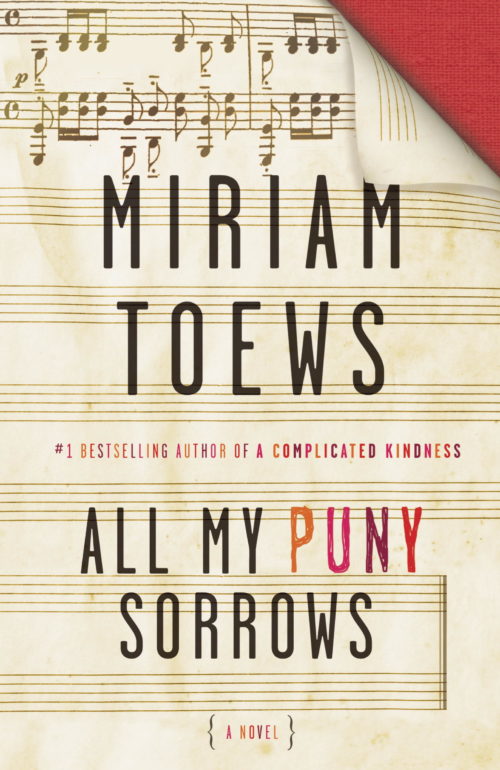

Relentlessly self-deprecating, she explains that she “had two kids with two different guys. It’s Yoli who is the story’s heroine, though she wouldn’t believe it. The dialogue is realistic and funny, and somehow, almost magically, Toews gets away with having her characters discuss things like books and art and the meaning of life without seeming pretentious or precious they’re simply smart, decent and confused. In both the past and present, Toews (who is the author of six earlier books that have received significantly more recognition in her native Canada than in the United States) perfectly captures the casual manner in which close-knit sisters enjoy and irritate each other. The flashbacks to Yoli and Elf’s childhood in a rural Mennonite community are vivid and energetic.

Such a synopsis would not, if I hadn’t read the book, seem to me enticing, but “All My Puny Sorrows” is irresistible. Many pages are devoted to the daily pattern of waiting out a family member’s hospital stay: trying to extract information from doctors and nurses, trying not to let non-hospital-related obligations fall into disarray, hugging, crying, hugging while crying, procuring food and sleeping (usually not well). Elf, is now in the psychiatric unit of a hospital, and most of the book’s suspense arises from the questions of whether she’ll attempt suicide again and whether she’ll persuade Yoli to help her. It’s a testament to the entertaining voice, emotional acuity and quick pacing of “All My Puny Sorrows” that it doesn’t become evident until about two-thirds of the way through how slight the plot is: Yoli has traveled to Winnipeg from her home in Toronto because her sister, Elfrieda, a brilliant and successful classical pianist, has - not for the first time - attempted suicide. In fact, spending time in the company of Yoli, a 40-something woman alternately busy with the work of caring for various family members and screwing up her own life, was the main reason I loved the book. The relevant question isn’t ‘Is this a potential friend for me?’ but ‘Is this character alive?’ ”įor the most part, I agree with Messud, yet as I devoured Miriam Toews’s latest novel, “All My Puny Sorrows,” I thought that I’d very much like to befriend the main character.

We read to find life, in all its possibilities.

“If you’re reading to find friends, you’re in deep trouble. “For heaven’s sake, what kind of question is that?” Messud responded. In a 2013 exchange that’s become famous in literary circles, the novelist Claire Messud took to task an interviewer at Publishers Weekly who observed that she - the interviewer - wouldn’t want to be friends with the protagonist of Messud’s most recent novel and asked if Messud herself felt the same way.


 0 kommentar(er)
0 kommentar(er)
